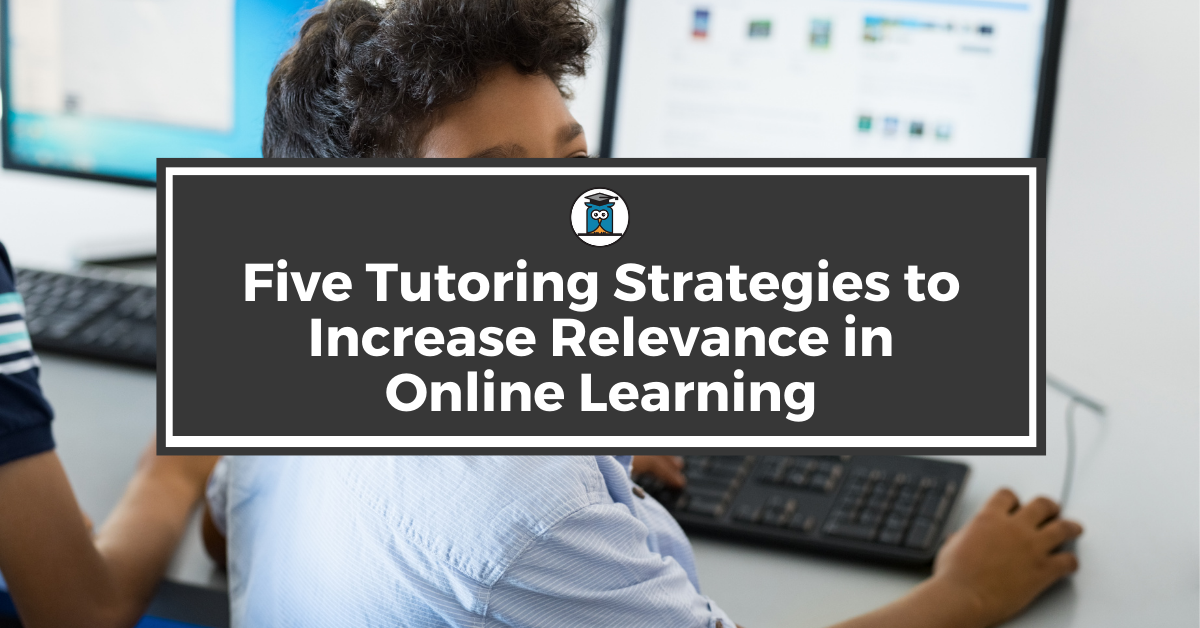By Karly B., MPP Tutor
Imagine being thrown into a foreign country where you don’t understand the language or culture. You don’t know how to ask for food or where to get local currency. You find a stranger who speaks your language. She offers to teach you, and you eagerly agree.
Then she starts lecturing you about moon cycles.
It’s not that you don’t think moon cycles are interesting, but it doesn’t feel relevant to your current situation. If the stranger explains that moon cycles inform the length of days and when business transactions like getting food take place, you can begin to see a connection. Moon cycles now matter to your current situation, and you probably feel more motivated to learn about them.
Online tutoring operates similarly to this analogy, especially in the face of the Covid-19 pandemic. Private tutoring companies like My Private Professor, based in Orange County, California, are shifting toward online services to meet student needs in the face of pandemic-related school closures. As a 5th grade tutor, my initial thought during the shift to online teaching was to format my content delivery to fit a new, strange online environment in a way that was accessible to young students. Establishing this sort of course content delivery seems like a logical first step, but it fails to account for how students’ lives are dramatically changing in the face of a global pandemic. To keep students engaged, we have to make sure that students can see why learning matters.
Relevance interventions have long been shown to increase student academic performance and to promote positive behavior among adolescents (Hulleman & Harackiewicz, 2009; Gaspard et. al, 2015). In the face of Covid and online learning, student face a host of new challenges that could make seeing the value of school more difficult than ever. From the distractions in new home learnings environments to the anxiety and uncertainty associated with getting sick, young learners face unprecedented challenges that tutors and educators must try to meet in order to ensure that their students stay on track.
Making course content more relevant will not eliminate low student motivation levels in online learning, but intentional efforts to make course content relevant to students’ lived experiences might mitigate some of the learning access barriers associated with this pandemic. Below are five useful strategies for tutors to consider for making online content more relevant.
- Ask students to bring examples to tutoring sessions. Online tutoring means that more students have immediate access to common household items. Teaching geometry? Ask your students to bring in a roll of paper towels as they learn about cylinders. For health, you might assign students to collect nutrition labels for their favorite foods. The possibilities here are wide and can vary by grade level and subject. The idea is to get students thinking about how what you’re learning in class is also present in their everyday lives.
- Encourage students to connect what you’re learning to their career goals through a free write. Relevance is not limited to students’ current lives. Students can also become more motivated when they see course content relevance to their long-term goals. You might prompt your students to consider how class concepts might be useful in a career that interests them. The complexity of this free write will vary by grade level, but the idea is the same across grades. If students have trouble finding a connection, offer to help them brainstorm.
- Task your students to bring in relevant news articles. With social media’s growing presence, news articles are all around us. Encourage students to think about how your class content relates to their local communities, state, or nation by assigning them to keep an eye out for news articles during tutoring sessions. If you’re tutoring students in different areas online, it might be useful to ask them to bring in articles from their local news outlets that cover the same state or national events. Compare and contrast how different areas overlap and respond differently to the same events and what aspects of their unique cultures may show up in their learning.
- Ask students to interview a friend or family member to see how they’ve used specific course concepts. Students may find content more relevant if they see how someone they know has used that content. Teaching trigonometry? Encourage students to talk to a family member who works in construction about how they use trigonometry in their jobs. Teaching measurement scales? Ask students to talk to a friend who works at a bakery. With increased access to online videoconferencing software like Zoom and Microsoft Teams, students can more easily conduct interviews with friends or family who aren’t physically nearby. This exercise may help you leverage that new capability to make your content feel more relevant for students.
- Make subject content relevant to the pandemic. Covid-19 is on all of our minds. Don’t ignore it. For subjects like economics and health, this connection might feel more natural to make, but it can apply to other subjects too. Teaching students to write a persuasive essay? Consider assigning a prompt where students have to persuade a grocery store cashier to sell them the last roll of toilet paper. For history, you might have students making a compare and contrast chart between Covid-19 and other global pandemics. There’s a lot of creative leeway here, as well as a lot of potential to make your course relevant to students’ most pressing concerns.
This list is not exhaustive. Other activities to promote relevance might be more specifically tailored toward specific grade levels or subjects. These general tips are meant to serve as a starting point for thinking about how to make your tutoring sessions feel relevant and timely in order to keep students motivated. Get creative!
References
Gaspard, H., Dicke, A.-L., Flunger, B., Brisson, B. M., Häfner, I., Nagengast, B., & Trautwein, U. (2015). Fostering adolescents’ value beliefs for mathematics with a relevance intervention in the classroom. Developmental Psychology, 51, 1226–1240. doi:10.1037/dev000002
Hulleman, C. S., & Harackiewicz, J. M. (2009). Promoting interest and performance in high school science classes. science, 326(5958), 1410-1412.
Karly B. is a tutor at My Private Professor, which provides individualized online & in-person tutoring to students in all subjects, including K-12 math, science, language arts, history, foreign language, AP exams, test prep, essays, & college counseling, by top tutors from top universities. www.myprivateprofessor.com







